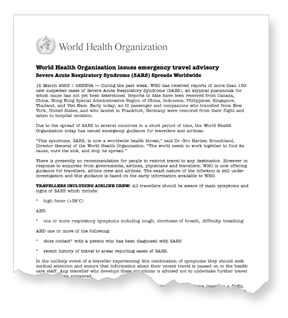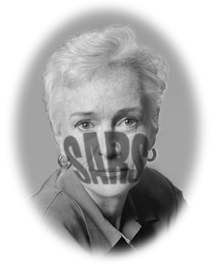AN INTERVIEW WITH WHO SPOKESMAN
DICK THOMPSON
by Peggy Girshman
[Dick Thompson was a journalist with TIME magazine for
23 years with assignments in San Francisco, India/Afghanistan/Kashmir,
and Washington, DC. He left when TIME was acquired by AOL. Thompson
became communications officer of communicable diseases for the World Health
Organization, in Geneva, in September 2001, and was WHO spokesman during
the SARS crisis. NPR’s Peggy Girshman interviewed Thompson
for ScienceWriters, in a cramped, drab office; one which he shares
with two other people. She was in Geneva as a judge for the WHO Journalism
Fellowship Program. More information on this program can be found here.-LTF]
PG: How did you end up here?
DT: TIME had run into some problems because
of the acquisition by AOL. They weren’t investing in reporting and
weren’t allowing any travel. It seemed like a good time to go. Plus,
they offered us a lot of money to go away. Coincidentally, one of the
people I regularly talk to when he comes to town is Dave Heymann (WHO
executive director of communicable diseases). We started talking about
the buyout package and he said, ‘Why don’t you come work in
Geneva?” I said, “Sure,” because I was interested in
Gro Harlem Bruntland (director general of WHO) and had actually written
a cover story on her but it never ran because it’s hard to get global
public health stories out to an audience.
 |
PG: Didn’t the journalist part of you say “no
way” about the new job?
DT: The thing about journalism is it gives a lot of meaning
to your life and makes a real social contribution. Giving that up would
be hard to do, if I were giving it up completely. But I’m a big
believer in public health. I believe it has saved more lives than high-tech
medicine. I thought if I could be a part of that then I could be doing
something that would be as socially valuable as journalism.
PG: So, the offer wasn’t “be our spokesperson”?
DT: No, because Dave had just hired someone to do that
(Ian Simpson of the BBC). Ian is a great reporter and is really
interested in daily messages and strategy and stuff like that. I don’t
know anything about that. So I came and one of the things I did was create
the WHO Journalism Fellowship Program and felt good about that.
PG: Did you think you’d be also able to write
at WHO?
DT: I was hoping I’d find a book here. When I left
TIME, I had just published a book, The Volcano Cowboys.
There’s an interesting section (at WHO) called “outbreak.”
The guys are like germ cowboys and I thought it would be great story to
do. But they really hate the press and they didn’t want to talk
to me. It took a long time to get to know these people.
I remember thinking,
“Should I put in the word “emergency”?
|
PG: In terms of your role here, did you ever feel funny
that you were inside the organization and not an outsider writing for
someone else?
DT: It’s a strange role because you’re viewed
as an outsider because you deal with the press. Lots of times people don’t
want to tell you things. I have a hard time keeping a secret anyway. And
my job is getting secrets and telling everyone about them. I’m not
really a public-health person in the eyes of a lot of people and not really
a journalist.
PG: Do you have an editor for the press releases you
write?
DT: Yes, but I have a lot of freedom with press releases
and how I frame stories.
PG: But it’s not the same as journalism?
DT: No.
PG: Can you include criticism (of WHO programs) in the
stories you write?
DT: Yes, and I think it’s important to do so.
PG: How did you end up being the SARS spokesperson?
DT: I’m in communicable diseases. Ian Simpson had
gone off to work in the director general’s office on a short-term
basis. I was at an outbreak meeting and somebody said “Oh, you should
pay attention to this bird flu H5N1 in Hong Kong, it’s really interesting.”
So, I started spending time on that. The Hong Kong media just went crazy
when there were two cases of bird flu. So I went to Manila. Then someone
called from Vietnam and said “I think we have cases of bird flu
here and it’s pretty contagious.” I passed on the information.
When I returned to Geneva we set-up an “outbreak response group.”
I was in it because I had been following H5N1 and they had to have a communications
person.
 |
PG: What did you have to do?
DT: I thought it was important that we respond to everybody,
all the time, no matter what. After a while, that meant getting calls
from Hong Kong at 3 o’clock in the morning. In the beginning, we
didn’t have any idea what was going on. I wrote a press release
on March 15 in which we named the disease. We gave characteristics of
it and said that travelers and health officials should look out for this
disease.
PG: Is this the most important thing you’ve written
in your career?
DT: Absolutely, by far. Because it did more, I think,
than anything else I’ve ever done. And that was done in one morning’s
work. We’d been working since 2 a.m. There was a doctor on a flight
from New York to Germany (suspected of being a carrier). We had to name
the disease. We had to alert people and describe the disease and then
get the bulletin out. So that morning, we named the disease SARS. And
then we heard that the CDC was holding a briefing (later that day). We
had no idea what they were going to say. Had we overreacted? Was this
a huge mistake? We really didn’t know. We weren’t all that
confident. Then CDC had its press conference. They called the disease
SARS and said it was a global health threat. They endorsed everything
we said down the line.
PG: I had assumed there were massive public health discussions
burning up the wires, globally.
DT: Our group was four people.
PG: No coordination among health agencies about what
to say?
DT: There were consultations about what was going on
but it was four of us who did it.
PG: When you wrote the press release, did you write
it like a story?
DT: Yes, but as a news story, not a feature story. The
news was on top and then we got down to the clinical description. And
I remember thinking “should I put in the word ‘emergency’?”
I sat at the computer thinking about this. Behind me somebody said “The
plane is landing in Germany and is being taken to another area of the
airport.” I thought again about the word ‘emergency.’
Hmmm. It’s kind of an eye-popper. So I put it in. At WHO everything
is reviewed. It’s a tough peer-review system. A great system. And
they left (emergency) in. After March 15, there was one other big outbreak.
Toronto was already underway, there was already community transmission.
But in 26 other countries, SARS appeared and it was stopped. It didn’t
embed itself into hospitals or the community. It was just stopped. So
that’s why I think (that news release) is the most important thing
I’ve ever written.
WHO Journalism Fellowship Program
Dick Thompson created and is administrator of the WHO Journalism
Fellowship Program. In 2002, the World Health Organization (WHO)
launched this experiment in journalism in which seven journalists
from around the globe are selected annually to spend two weeks in
Geneva, learn about public health issues, and then travel for a
week reporting anywhere in the world.
The fellowship has two components. First, it trains journalists
in a range of emerging public health issues through daily seminars
at WHO’s Geneva, Switzerland headquarters. Second, the program
encourages reporters to follow one public health topic that is of
concern to their home audience into another country in order to
view the topic in a different cultural and political context.
For more information or to apply visit www.who.int/infectious-disease-news/fellowship_bulletin. |
PG: How did you triage all the press calls?
DT: I was quickly getting worn out with only to two or
three hours of sleep a night. So I had people (at WHO) identify the major
media in different regions. For example, I had no idea there are 55 BBC
bureaus! I asked other people (at WHO) to help, but that wasn’t
working because there are just three phone lines. They were all ringing.
There was just too much to do. So we created a virtual press conference.
We had radio-quality sound and television so people could ask questions.
We also had a Web site that was getting eight million hits a day.
PG: At what point did you establish the virtual press
conference?
DT: I think it was a week or two (into the crisis). We
were getting thousands of e-mails a day. At the peak, it was 3,000. I
told the reporters if they wanted to send an e-mail to type “‘press”
in the subject line. And I put an auto response on my e-mail to direct
others to the Web site because a lot of the questions were people asking
things like “I’m going to Paris this weekend, is it safe?”
PG: What do you want to do next?
DT: I would like to provide guidance on outbreaks in
how to use communication. I want to write a book about public health and
the response to SARS. Not a narrative about what happened as much as a
history-of-science story and how we responded.
#
Peggy Girshman is an assistant managing editor at National Public
Radio.
| Editor’s note:
As this issue of ScienceWriters went to press, WHO declared
SARS had been contained. However, due to many remaining questions
about the virus and the possibility that cases may have slipped through
the surveillance net, WHO warns that continued global vigilance for
SARS is crucial for the foreseeable future. |
|

